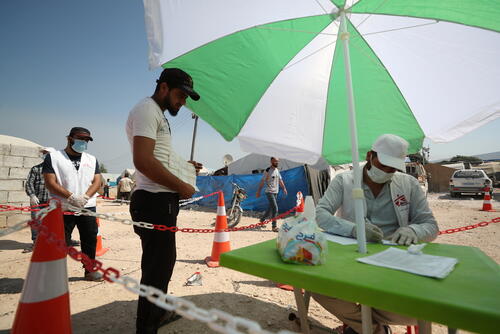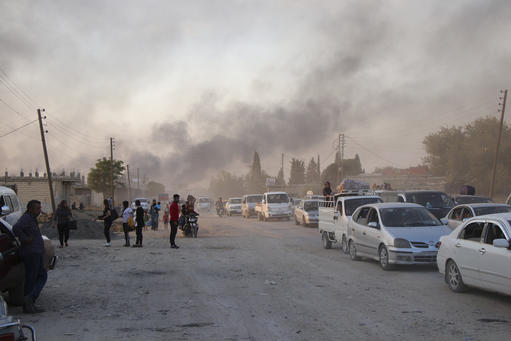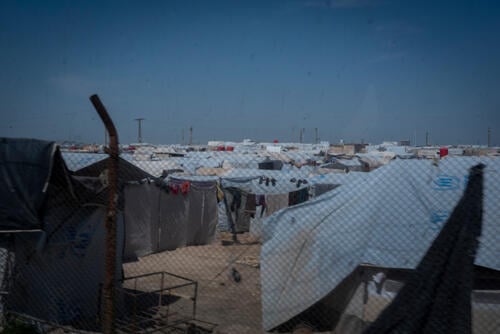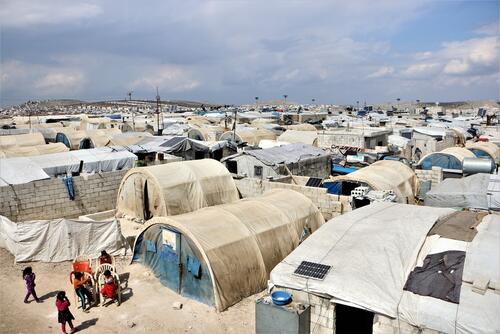Northwest Syria is currently witnessing a sharp increase in the number of patients with COVID-19, which is now ten times higher than what it was just a month ago. As of 22 September, 640 people had tested positive for the new coronavirus in the region, almost 30 per cent of them health workers.
Eighty new cases were recorded on 14 September alone, the highest one-day total since the first case was recorded in early July. Furthermore, testing has remained limited throughout that time, which raises doubts about the real rate of transmission and the true number of infections.
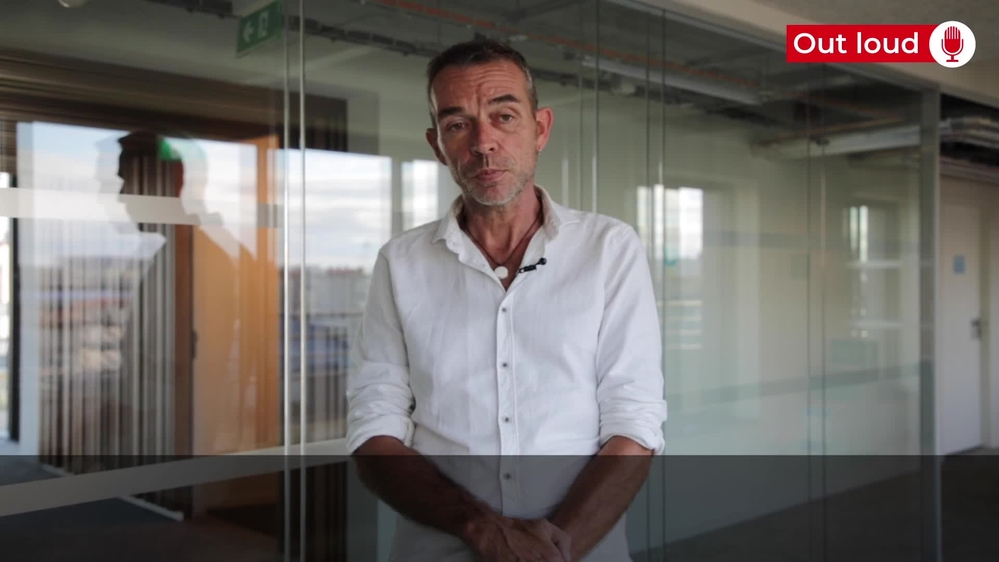
Distributing hygiene kits to displaced people amid COVID-19 in northwest Syria
Coronavirus increasing among displaced people
This increase in the number of people infected with COVID-19 in the region is adding more challenges to an already-dire situation in northwest Syria. More than two million people, over half of the population, have been displaced by conflict.
Most of them now live in overcrowded camps with scarce access to water and poor sanitation. Control measures, such as physical distancing, hand-washing and isolating are challenging, if not simply impossible, for most camp residents.
“More and more COVID-19 cases are being recorded among displaced people living in camps and this is worrying,” says Dr Ammar, MSF medical activity manager in northwest Syria. “We’re trying to help the camps’ inhabitants protect themselves against the virus, but we can’t change the overall situation and the fact that they live in such a place. We need to adapt constantly to provide solutions for these people who already are living in incredibly difficult conditions.”
We’re trying to help the camps’ inhabitants protect themselves against the virus, but we can’t change the overall situation and the fact that they live in such a place.Dr Ammar, MSF medical activity manager in northwest Syria
MSF teams raising awareness and distributing soap
Since April 2020, MSF teams have distributed more than 63,000 hygiene kits, including items such as soap and detergent, to over 26,000 displaced families in several camps across Idlib governorate and northern Aleppo governorate.
“We put in place different measures to prevent creating crowds of people coming to pick up their kits during these distributions,” explains Osama, a logistician supervising one of the distribution campaigns. “People are asked to maintain a safe distance between each other and to regularly wash and sanitise their hands. We ask each family to only send one person to the distribution site.”
Our health educators also conduct awareness-raising sessions about the virus, especially how it is transmitted and how they can prevent this, with people queuing to receive the kits.
“Understanding COVID-19 and knowing more about it is a big step towards avoiding catching it,” says Osama.
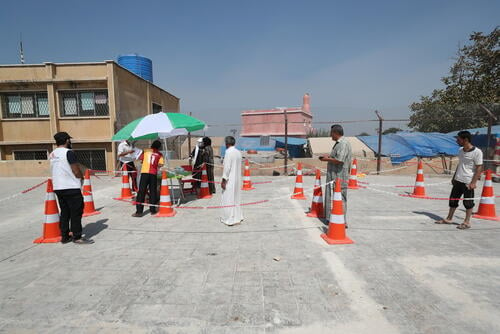
Helping to manage isolation to manage the pandemic
Many health facilities were already struggling to meet existing medical needs in northwest Syria before the COVID-19 pandemic. To help them, MSF teams are also working in health facilities to treat patients with COVID-19 or that have other medical needs. For example, we have set-up a triage system in each the hospitals that we support, co-manage or run in Idlib governorate. These ensure fast detection of suspected COVID-19 cases, while maintaining continuity of care for patients in the wards.
“A few days ago, a young girl came to one of the hospitals we co-manage. She was still at the entrance when she was screened as a potential COVID-19 case,” says Dr Halim Boubaker, MSF medical coordinator for northwest Syria. “She was referred to another health facility where she tested positive for COVID-19.”
“However, one major issue we are currently facing is that most patients who test positive isolate at home with their families, rather than in isolation centres,” says Dr Boubaker. “This increases the chances of creating new clusters of infections and has certainly contributed to the recent rise in the numbers of COVID-19 cases.”
Northwest Syria was already an unstable region and we were used to overcoming uncertainty to provide assistance to people... But COVID-19 has added an extra challenge to our work.Dr Halim Boubaker, MSF medical coordinator for northwest Syria
“Various isolation sites have been opened and patients showing COVID-19 symptoms can go there to be tested and taken care of,” Dr Boubaker continues. “More people isolating in these centres rather than in the community would definitely help in slowing down the rate of infections.”
Nine dedicated COVID-19 hospitals (with a combined 645 available beds) and 14 isolation and treatment centres providing basic care to patients with mild symptoms (with 550 beds) have been set-up in response to the pandemic.
“Right now, very few of the available beds in the isolation centres and hospitals are occupied, but the number of COVID-19 cases keeps on rising,” adds Dr Boubaker. “This makes the situation particularly worrying.”
MSF managing the challenges in northwest Syria
To further support the COVID-19 response in the region, MSF is managing a 30-bed treatment centre for moderate and severe patients, which can refer critical patients to the Idlib national hospital. MSF has also recently built an additional 31-bed isolation site in the town of Salqin that will be operational in case there‘s a need to provide more isolation capacity for patients with mild to moderate symptoms in the future.
“We are trying to work on both fronts and contribute both to the prevention of COVID-19 and treating patients,” says Dr Boubaker. “We continue to do our utmost to also keep our regular services running because people still need these despite the pandemic.”
“Northwest Syria was already an unstable region and we were used to overcoming uncertainty and complicated situations to provide assistance to people,” concludes Dr Boubaker. “But COVID-19 has added an extra challenge to our work.”




